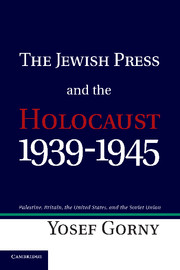 The Jewish Press and the Holocaust, 1939–1945
The Jewish Press and the Holocaust, 1939–1945 Book contents
- Frontmatter
- Contents
- Preface
- Introduction
- Part I From Concern to Outcry – 1939–1942
- Part II The Illusion Dashed – 1942–1945
- Part III The Individual Confronts the Horror
- 7 Yitzhak Gruenbaum – “The Main Culprit”
- 8 The Intellectuals’ Delusional Optimism
- 9 Between Lidice and Majdanek
- 10 Remarks on the Continuing Jewish Angst
- Conclusion
- Bibliography
- Index
- References
8 - The Intellectuals’ Delusional Optimism
from Part III - The Individual Confronts the Horror
Published online by Cambridge University Press: 05 November 2011
- Frontmatter
- Contents
- Preface
- Introduction
- Part I From Concern to Outcry – 1939–1942
- Part II The Illusion Dashed – 1942–1945
- Part III The Individual Confronts the Horror
- 7 Yitzhak Gruenbaum – “The Main Culprit”
- 8 The Intellectuals’ Delusional Optimism
- 9 Between Lidice and Majdanek
- 10 Remarks on the Continuing Jewish Angst
- Conclusion
- Bibliography
- Index
- References
Summary
In 1939–1942, as newspaper editorial boards in the three countries exhibited a cautiously optimistic frame of mind in regard to the fate of the Jews, various intellectuals expressed much more optimistic assessments and even offered rational solutions for the Jews’ postwar future.
The term “intellectual” in this context includes historians, philosophers, writers, publicists, researchers, and also public figures – to the exclusion of newspaper editors, ranking journalists, regular publicists, and politicians whose words appeared in newspapers. The difference between the two is not only institutional but also topical. The men and women of the press focused their discussion on the present; the “intellectuals” pondered the future. While the journalists dealt with the existential politics of the war era, the intellectuals turned their attention to the historical processes that would follow the war. The intellectuals’ interest in the future originated in the utopian tendencies that belong to the structure of all critical intellectual thinking irrespective of its purpose: an attempt to correct reality or raze it to the ground. The intellectuals who populated the group of concern to us had no need to advocate the destruction of the existing reality because this reality was steadily being destroyed as they looked on. What remained for them, then, was to cogitate rationally about the rebuilding of Jewish society after the war. The failure of their intellectual optimism resided in the contrast between acknowledgment of the “destructive” reality and faith in the “constructive” future.
- Type
- Chapter
- Information
- The Jewish Press and the Holocaust, 1939–1945Palestine, Britain, the United States, and the Soviet Union, pp. 220 - 230Publisher: Cambridge University PressPrint publication year: 2011


